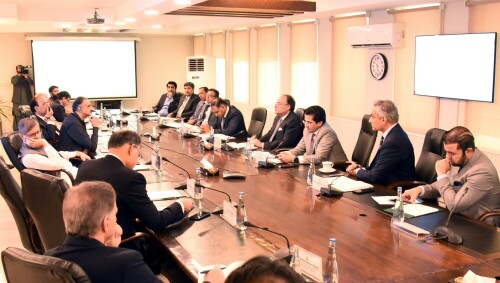High-Level Committee Formed to Oversee Petroleum Prices and Supply
Prime Minister Shehbaz Sharif has established a high-level committee with the mandate of monitoring both the pricing and supply of petroleum products, a move prompted by escalating regional tensions.
A statement released by the Ministry of Finance on Monday detailed that this decision is a direct response to the evolving geopolitical landscape, particularly in light of the recent conflict involving Israel and Iran, which has introduced volatility into global oil markets. The committee’s primary objective is to carefully observe and manage petroleum product pricing and supply dynamics.
The newly formed committee will be under the leadership of Finance Minister Muhammad Aurangzeb. Its membership includes high-ranking officials from key federal ministries, regulatory bodies, and experts in the energy sector.
“The creation of this committee demonstrates the government’s proactive stance towards protecting the country’s energy interests and maintaining market stability amidst growing international uncertainties,” the statement noted.
The committee’s specific responsibilities include:
- Closely monitoring forward and futures prices of petroleum products.
- Assessing the stability and reliability of the supply chain, given the current regional conflict.
- Determining the short- and medium-term foreign exchange implications of price fluctuations.
- Developing a contingency plan, if necessary, to prevent supply disruptions and ensure adequate market supply.
- Conducting a comprehensive analysis of the potential fiscal impacts should the conflict prolong.
On the international front, oil prices showed volatility on Monday, experiencing a surge of 7% on Friday. This was triggered by renewed hostilities between Israel and Iran over the weekend, which heightened concerns about a potential widening of the conflict across the region and significant disruptions to Middle Eastern oil exports.
By 0507 GMT, Brent crude futures had increased by 64 cents, reaching $74.87 a barrel, a 0.86% rise. Similarly, US West Texas Intermediate crude futures saw an increase of 76 cents, climbing to $73.74, reflecting a 1.04% gain.
Adding to the global apprehension, Iranian missiles reportedly struck areas near Tel Aviv and the port city of Haifa, intensifying fears among world leaders at the G7 meeting that the ongoing conflict could escalate into a broader regional crisis.
The recent exchange of strikes between Israel and Iran resulted in civilian casualties, prompting both militaries to advise civilians in the opposing territories to take precautions against potential future attacks.
These developments have amplified concerns regarding potential disruptions in the Strait of Hormuz, a critical global shipping route. Approximately one-fifth of the world’s total oil consumption, equating to about 18 to 19 million barrels per day of oil, condensate, and fuel, traverses this strait.
During its initial meeting on Monday, the committee thoroughly evaluated the global and domestic petroleum market conditions.
“The committee conveyed its satisfaction with Pakistan’s current petroleum product stock levels, affirming that there is no immediate threat of supply shortages.
“Nevertheless, members underscored the importance of maintaining vigilance due to the rapidly evolving regional situation,” the statement clarified.
To facilitate quick responses and effective coordination, a dedicated working group will monitor developments daily. The full committee will convene weekly to assess the situation and provide recommendations to the Prime Minister.
The Petroleum Division will serve as the secretariat, ensuring the effective execution of the committee’s directives.
The government reaffirms its dedication to “upholding energy security, stabilising markets, and protecting the national interest during these challenging times”.



Comments (0)
No comments yet. Be the first to comment!
Leave a Comment